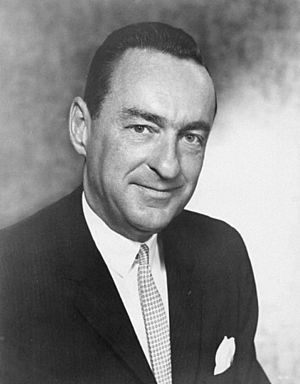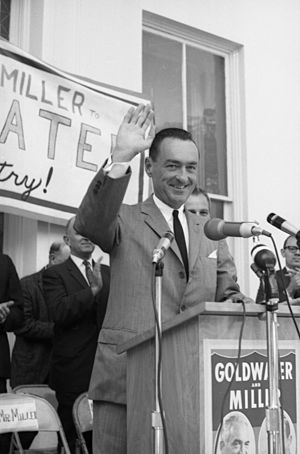William E. Miller facts for kids
Quick facts for kids
William Miller
|
|
|---|---|

Miller c. 1964
|
|
| 44th Chair of the Republican National Committee | |
| In office June 2, 1961 – June 15, 1964 |
|
| Preceded by | Thruston Morton |
| Succeeded by | Dean Burch |
| 11th Chair of the National Republican Congressional Committee | |
| In office 1960–1961 |
|
| Preceded by | Richard M. Simpson |
| Succeeded by | Bob Wilson |
| Member of the U.S. House of Representatives from New York |
|
| In office January 3, 1951 – January 3, 1965 |
|
| Preceded by | William L. Pfeiffer |
| Succeeded by | Henry P. Smith III |
| Constituency | 42nd district (1951–1953) 40th district (1953–1965) |
| District Attorney of Niagara County, New York | |
| In office 1948–1951 |
|
| Preceded by | John S. Marsh |
| Succeeded by | Jack E. Gellman |
| Personal details | |
| Born |
William Edward Miller
March 22, 1914 Lockport, New York, U.S. |
| Died | June 24, 1983 (aged 69) Buffalo, New York, U.S. |
| Resting place | Arlington National Cemetery |
| Political party | Republican |
| Spouse |
Stephanie Wagner
(m. 1943) |
| Children | 4, including Stephanie |
| Education | University of Notre Dame (BA) Union University, New York (LLB) |
| Military service | |
| Allegiance | |
| Branch/service | |
| Years of service | 1942–1946 |
| Rank | First Lieutenant |
| Unit | Judge Advocate General's Corps |
| Battles/wars | World War II |
William Edward Miller (born March 22, 1914 – died June 24, 1983) was an American politician. He was a member of the Republican Party. Miller served in the United States House of Representatives for New York.
In the 1964 presidential election, he was the Republican candidate for Vice President. He was the first Catholic person nominated for this office by the Republican Party.
Miller was born in Lockport, New York. He went to the University of Notre Dame and Albany Law School. After finishing school, he became a lawyer in Lockport. During World War II, he served in the United States Army. He worked as a prosecutor in the Nuremberg Trials, which were trials for war criminals.
After the war, Miller became a district attorney in New York. In 1950, he was elected to the U.S. House of Representatives. He served there for 14 years. He also led the National Republican Congressional Committee and the Republican National Committee. In 1964, he ran for Vice President with Barry Goldwater. They lost the election to Lyndon Johnson and Hubert Humphrey.
After leaving politics, Miller went back to being a lawyer. He passed away in Buffalo, New York, in 1983. He was buried at Arlington National Cemetery.
Contents
Early Life and Education
William Edward Miller was born on March 22, 1914, in Lockport (city), New York. His parents were Elizabeth Hinch and Edward J. Miller. He went to local schools in Lockport. In 1931, he graduated from Lockport High School.
Miller then attended the University of Notre Dame. He earned a Bachelor of Arts degree in 1935. Later, he studied law at Albany Law School of Union University, New York. He received his law degree in 1938. That same year, he became a lawyer and started working in Lockport. In 1942, he began working for the federal court in Buffalo.
Career in Public Service
Military Service During World War II
Miller joined the United States Army on July 1, 1942. He trained in the Army's intelligence branch. He served with an intelligence unit in Richmond, Virginia. In May 1945, Miller became a first lieutenant. He was assigned to a special group that dealt with war criminals.
In August 1945, he became an assistant prosecutor. He helped prosecute Nazi war criminals during the Nuremberg Trials. These trials held people accountable for terrible crimes during the war. Miller left the Army in March 1946 and returned home.
Becoming a District Attorney
From 1946 to 1948, Miller worked as an assistant district attorney. This job was in Niagara County, New York. In January 1948, the main district attorney position became open. The governor of New York, Thomas E. Dewey, chose Miller to fill the spot.
Later that year, Miller was elected to serve a full term. He worked as the district attorney until January 1951. He then resigned because he was preparing to become a member of Congress.
Serving in Congress
In August 1950, Miller won the Republican nomination for Congress. He ran in New York's 42nd Congressional district. He won the election in November against Mary Louise Nice.
After some changes to district maps, Miller was in New York's 40th Congressional District. He was re-elected easily every two years from 1952 to 1962. He became a senior Republican member of the Judiciary Committee. He helped pass two important laws. One was about developing hydroelectric power at Niagara Falls. The other allowed for a new canal between Lake Erie and Lake Ontario.
Miller also became important in how the House of Representatives worked. In 1959, he helped replace the Republican leader, Joseph W. Martin Jr., with Charles Halleck. Republicans wanted a more conservative leader after losing seats in 1958. Miller voted for the Civil Rights Acts of 1957, 1960, and 1964. He also supported the 24th Amendment, which banned poll taxes.
In 1960, Miller was chosen to lead the National Republican Congressional Committee. This group helps Republican candidates get elected to the House. In the November election, the Republican Party gained 22 House seats. This was a big success, especially since Republicans lost the presidential election that year.
Leading the Republican National Committee
Because of his success in the 1960 House elections, Miller was chosen to lead the Republican National Committee. This is the main organization for the Republican Party. He served as chairman from 1961 to 1964. He encouraged the party to become more conservative. He also quietly supported Barry Goldwater for president in 1964.
As chairman, Miller helped the party during the 1962 Congressional elections. Republicans lost a few seats in the Senate but gained some in the House. Also, Democratic candidates in the Southern states faced tougher races than expected. This showed that the Democrats' strong hold in the South was weakening.
In the early 1960s, Miller and Senator Barry Goldwater supported a plan called the Southern Strategy. This plan aimed to help Republicans gain support in the Southern states. These states had traditionally voted Democratic since the American Civil War. The idea was to appeal to white conservative voters in the South. This meant focusing on ideas like smaller government and states' rights.
Miller agreed with Goldwater and supported the Southern Strategy. Republican leaders decided to use this strategy for the 1964 elections and beyond.
Running for Vice President
After Barry Goldwater won the Republican presidential nomination, he chose Miller as his running mate. Goldwater said he picked Miller because Miller's political actions "drove Johnson nuts." However, some reports suggest Johnson barely knew who Miller was.
Miller was from the Eastern U.S. and was Catholic. This helped to balance the ticket in some ways. But he was also conservative, like Goldwater. He was not very well-known. People often joked, "Here's a riddle, it's a killer / Who the hell is William Miller?"
In the 1964 general election, the current president, Lyndon B. Johnson, won by a large amount. The Goldwater/Miller team only won six states. These were Goldwater's home state of Arizona, plus Louisiana, Alabama, Mississippi, Georgia, and South Carolina. Even though they lost, their success in the South showed that the Southern Strategy could work. Republicans continued to use this strategy in future elections.
Later Life
After the Goldwater–Miller team lost the election, Miller went back to his hometown. He returned to Lockport (city), New York, and continued his law practice. He also appeared in one of the first "Do you know me?" commercials for American Express. Later, a newspaper said that by the time he died, Miller was "better known for his advertising appearance than his years in Congress."
In an interview in 1979, Miller said he did not miss politics. He felt he had "had such a saturation of it in my life."
On June 5, 1983, he went to a hospital for tests. He had a stroke in mid-June and passed away in Buffalo, New York, on June 24, 1983. Miller was buried at Arlington National Cemetery. When Miller died, Goldwater said he was "one of the greatest men I have ever known."
Personal Life
William Miller and his wife, Stephanie (Wagner), had four children. They had three daughters and one son. Their youngest daughter, Stephanie Miller, became a stand-up comedian and a TV host. Since 2004, she has hosted a nationally broadcast political radio talk show. Their son, William E. Miller Jr., ran for Congress in 1992 and 1994 but did not win.
Images for kids
 | Misty Copeland |
 | Raven Wilkinson |
 | Debra Austin |
 | Aesha Ash |



